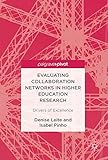Evaluating Collaboration Networks in Higher Education Research [electronic resource] : Drivers of Excellence / by Denise Leite, Isabel Pinho.
Material type: TextPublisher: Cham : Springer International Publishing : Imprint: Palgrave Macmillan, 2017Description: XV, 129 p. 6 illus. online resourceContent type: text Media type: computer Carrier type: online resourceISBN: 9783319452258Subject(s): Education | Educational sociology | Higher education | Education and sociology | Sociology, Educational | Sociology -- Research | Economic development | Education | Higher Education | Research Methodology | Sociology of Education | Sociology of Education | Development StudiesAdditional physical formats: Printed edition:: No titleDDC classification: 378 LOC classification: LB2300-2799.3Online resources: e-book Full-text access
TextPublisher: Cham : Springer International Publishing : Imprint: Palgrave Macmillan, 2017Description: XV, 129 p. 6 illus. online resourceContent type: text Media type: computer Carrier type: online resourceISBN: 9783319452258Subject(s): Education | Educational sociology | Higher education | Education and sociology | Sociology, Educational | Sociology -- Research | Economic development | Education | Higher Education | Research Methodology | Sociology of Education | Sociology of Education | Development StudiesAdditional physical formats: Printed edition:: No titleDDC classification: 378 LOC classification: LB2300-2799.3Online resources: e-book Full-text access | Item type | Current library | Collection | Call number | Copy number | Status | Notes | Date due | Barcode |
|---|---|---|---|---|---|---|---|---|
| E-Books | MEF eKitap Kütüphanesi | Springer Nature | LB2300 -2799.3 (Browse shelf (Opens below)) | Available | NATURE | 1420087-1001 |
Chapter 1. Theoretical approaches to research collaboration networks: a new science -- Chapter 2. What is collaboration and research collaboration -- Chapter 3. What do we measure, by evaluating research collaboration networks or the researcher productivity -- Chapter 4. Research collaboration networks: what do researchers say and what do networks show? -- Chapter 5. Limits and frontiers to international collaboration in emerging countries.
This book identifies key factors that drive the development and improvement of higher education research in emerging and advanced economies. In an increasingly interconnected world, knowledge production supported by strong research is a channel for the development of nations. The authors of this book argue that in order to drive knowledge production, leaders must strive to improve their understanding of how global research networks interact with one another, especially from the perspective of internationalization. This book is a useful resource for higher education researchers interested in knowledge production and dissemination as well as academic leaders and practitioners, students, and leaders interested in public administration policies and management. Denise Leite holds a PhD in Education and Human Sciences from Universidade Federal do Rio Grande do Sul (UFRGS), Brazil. Isabel Pinho holds a PhD in Education from Universidade Federal do Rio Grande do Sul (UFRGS), Brazil, and a PhD in Management from the University of Aveiro, Portugal.
5
